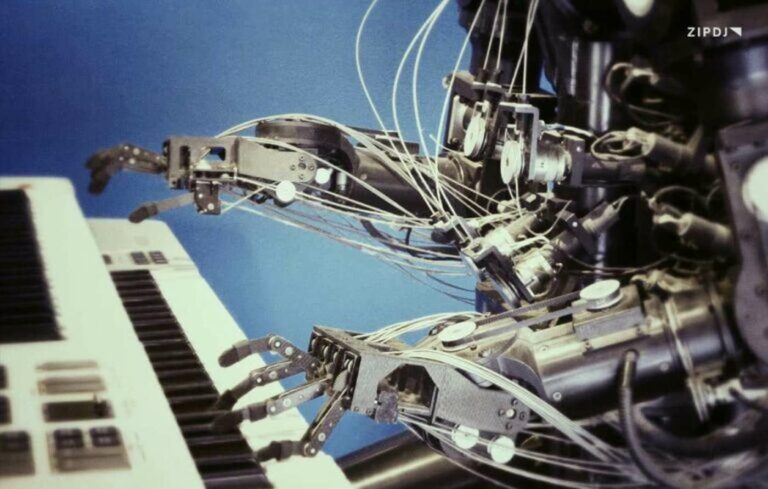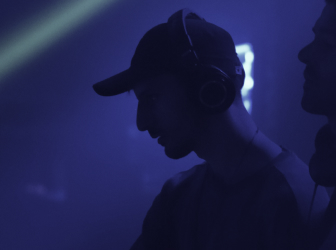What Is The Future of Music? Our Thoughts & Predictions In 2025

The future of music is one in which artificial intelligence, virtual reality, and other technological innovations will play an increasing role in the industry.
The nature of making music through machine learning and the role of social media in democratizing music creation will continue to evolve.
In this article, we’ve outlined our thoughts and predictions for how music technology will impact the industry in new and exciting ways.

What Is The Future of Music? Our Thoughts & Predictions In 2025
With the music industry responding to AI technology, how we engage with music discovery is transforming.
At the same time, methods used to create music are also being impacted as technology continues to improve exponentially.
So, with that in mind, here are our thoughts and predictions for the future of music in 2025:
Data-Driven Streaming Services
Online music streaming services have continued to grow in popularity in recent years, with Spotify leading the pack.
Other platforms such as Apple Music and Tidal are also developing a strong following of users and giving music listeners more options where to stream content.
While learning how to DJ with Spotify has its flaws, the platform continues to broaden its features and become a more compelling option for online DJ sets.
Perhaps the biggest shake-up of online music streaming services is the role data will play in how these companies develop content and subscription plans.
This data on usage and behavior is already being used to help craft bespoke content subscription plans for users that draw on a variety of formats.
For example, Spotify is partnering with major record labels in the music industry and teaming up with video streaming services to create customer subscription bundles.
New revenue models and collaborations with third-party businesses and advertisers will also allow streaming services to address profitability issues.
The upshot of these changes will mean more revenue for streaming services to foster human creativity, compensating indie artists and making production profitable.
Direct Uploads To Social Media Networks
The interplay between social media and DJing continues to evolve, with many top DJs using their social media pages to communicate with their fans instantly.
Whether DJing in clubs or working as a mobile or wedding DJ, social media is crucial to promoting your content online.
As music production and distribution become increasingly democratized thanks to the proliferation of affordable production software, social media will grow in significance.
Music composition and production are all possible on a smartphone with basic apps, and creators will increasingly share their work directly through social media.
Whereas previously, artists had to upload content to dedicated music platforms such as SoundCloud or Spotify, this will increasingly become a secondary consideration.
Likewise, collaborative music production methods that allow friends to work simultaneously on projects will also benefit from interaction through social media channels.
It’s something we’ve already seen with TikTok, where users can create music-based content quickly and easily and share it directly on the platform.
As direct uploads to social media become more popular, artists will be able to reach an audience of hundreds of thousands without the need for dedicated hosting platforms.
New Revenue Streams
Perhaps one of the biggest stumbling blocks for musicians and producers is the difficulty of transforming their content into a steady monetization stream.
With streaming services often criticized for their low revenue-sharing models with artists, it’s clearly something that has needed addressing for some time.
One example of an emerging revenue model impacting music production and monetization is the rise of non-DSP revenue systems.
An acronym for “demand-side platform,” DSP revenue is when the publishers generate revenue and advertisers promote content.
Platforms such as TikTok and Twitch have already moved away from this model for artists, allowing them to take center stage with income generation.
While music revenue is expected to fall on traditional streaming services, this new revenue model will help content creators build a following and remain relevant.
It’s also likely that additional new and competitive approaches to revenue sharing will also shake up the music industry as more people enter the field.
A Renewed Interest In Live Music
The future of music isn’t entirely about the emergence of new technology; the human touch found in live music will play a prominent role in this evolution.
The history of DJing is intimately interwoven with live music and venues, and a growing demand for experiencing music in these settings is already being felt.
While there are tentative steps toward introducing concepts such as virtual reality into the music space, consumers still demand a real-world relationship with artists.
Live shows enhance the human element of music and a shared experience with other music lovers where fans can connect and socialize.
Industry analysts predict a continuing growth of the live music industry over the following years, predicting it will pass the $30 billion mark by 2025.
At the same time, technology will serve the live music scene by allowing for more elaborate visual shows that use holograms and other emerging technologies.
International music festivals and prominent nightclubs are all set to see increases in attendance as music fans look to experience their favorite acts in person.
AI-Assisted Songwriting & Music Production
The role of artificial intelligence in music has been rapidly evolving over recent years and transforming the way music production is performed.
Algorithm-driven mastering, instruments, and audio repair tools are all reshaping how music producers craft their tracks and save valuable time.
At the same time, the emergence of AI-powered clones of popular singers is leading to innovations in mashups and remixes of popular music.
These tools have opened up opportunities for music production to people without deep and extensive knowledge of the techniques involved in the process.
While they are certainly helping producers rapidly increase their workflow, there’s some concern that this will lead to the marketplace being swamped with inferior products.
In order for AI to fully integrate into the music industry and production workflow, it will require creative human input to keep it on the right path.
Artificial intelligence is still in its infancy, so it remains to be seen how its evolution will impact future generations of music producers.

The Rise Of Lossless Audio
One of the main sticking points for audiophiles regarding streaming services is the low sound quality many of these platforms offer.
As broadband connections continue to improve with faster connection speeds, serious music lovers expect a similar improvement in streaming quality.
This means many streaming services are switching to high-quality, lossless, high-resolution audio formats.
A relative newcomer on the scene, Tidal, stood out from the competition with lossless audio, with Apple Music and Amazon Music HD following suit.
Spotify is also working on entering the lossless audio market with the creation of Spotifi HiFi, bringing the format to a huge base of music lovers.
These changes will revolutionize streaming services by allowing fans to listen to their favorite music in the audio quality it was intended to be heard in.
As the best DJ headphones deliver more advanced technology for optimal audio reproduction, lossless audio will be increasingly prominent.
Technological Advancements In VR & AR
While innovations in the audio sphere dominate the music industry, visual developments are also significantly impacting the industry.
Over the years, the best DJ visuals have evolved in tandem with new technologies, such as holograms and LED lighting, to improve how live shows are performed.
The advent of virtual reality and augmented reality are once again reshaping the nature of interactions between the artist and the audience.
There have already been tentative steps towards creating live shows for home-based audiences using the latest virtual reality technology.
Such shows allow for enhanced interaction between the audience and the artists, integrating with social media to improve levels of engagement.
VR and AR technology also influence how music production is performed, with virtual mixers and other hardware allowing for more creative opportunities.
AR object identification technology is set to increase musical creativity by allowing for an interactive flow of ideas and interactions for collaborative production.
Global Music Production Growth
The epicenter of the music industry has typically been associated with the American market, with Japan, the United Kingdom, and Germany also major players.
A notable trend, however, has seen a rapid expansion of music production and distribution in countries typically not associated with high revenue.
For example, the music industry in Latin America has experienced significant growth in recent years, with Brazil and Mexico dominating the region.
Perhaps the most surprising area of growth has occurred in Sub-Saharan Africa, where the explosion in the music industry has impacted the global scene.
Likewise, North Africa and the Middle East have also seen significant growth, further confirming the overall trend of growth in the developing world.
Japan, China, and South Korea sit at the epicenter of market growth in Asia, with J-pop and K-pop viable commercial exports with international appeal.
In contrast, music industry growth in Western nations has slowed down, signifying a greater potential for music production in these new territories.
The consequence of this shift in music production and industry growth will bring new influences to the table that will reshape a variety of genres.
The Emergence Of New Music Genres
As the international music community becomes increasingly connected, producers are becoming exposed to a broad range of world music styles.
This melting pot of influences is paving the way for new and exciting genres that blend various elements in unique ways.
This trend is already evident in the hyper movement, with the hyperpop genre making waves in the music industry with artists such as 100 Gecs and Dorian Electra.
Defined as dance-pop on steroids, the hyperpop scene is designed for the modern world’s shorter attention span and rapid consumption through social media.
In contrast, a move away from electronic music is also underway, with artists and bands eschewing technology in favor of live instruments.
This trend is similar to the emergence of punk and psychedelic rock in the 1960s and 1970s, where artists sought out compositions that broke new ground.
Whether you’re learning how to DJ house music or becoming a producer, the future of music will be intimately linked with new and exciting genres.
Democratized Music Creation
The impact of technology on the future of DJing and music production is multi-faceted, but perhaps the most profound effect is the democratization of music creation.
Nowhere is this more evident than in the advent of free-to-use apps for music production, which anyone can use on the move to create their own tracks.
Combined with AI-powered tools, these apps and programs mean people no longer require a budget for expensive production gear.
Gone are the days when expensive studios were essential for production, while online distribution methods also cut out the necessity for a record-label contract.
Online platforms such as SoundCloud and YouTube will continue to play a dominant role in how artists reach their fans instantly.
This means the traditional gatekeepers of popular music can be more easily circumvented, with new artists able to break through and become successful independently.
This transference of power from large corporations to independent creators using the internet to their advantage is perhaps the biggest game-changer of all.
Music producers and songwriters can work directly with other artists, enjoy complete creative control over their work, and stay true to their vision.
Summary
So there you have it, our guide covering how technology is causing music producers and DJs to rethink how they approach their art forms.
With record companies embracing these changes and music producers utilizing AI, future generations have potentially limitless creative endeavors.
With new technologies and online tools opening up production and DJing to a new generation, the future of music is bright.
Stay on the cutting edge of music with a ZIPDJ subscription and discover the latest hit tracks and exclusive remixes.
Not a member ?
Join Today for Unlimited Music Downloads. Visit zipdj.com for more information.



